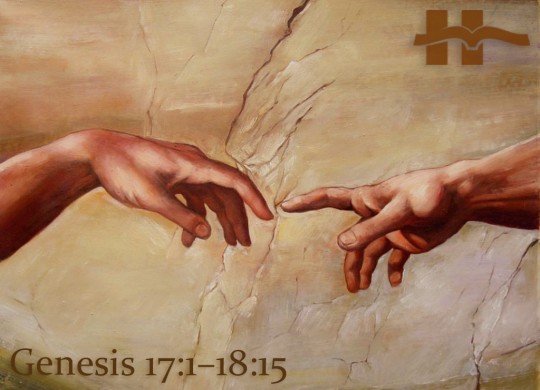Genesis 17:1−18:15

God’s blessing upon oneself and one’s associates is conditioned upon a faithful walk before God, a commitment remembered by a formal act of dedication.
It is now thirteen years after the events of Gen 16, and Abram must surely have been wondering when the promise of Yahweh regarding descendants would be fulfilled. The statement of the man’s age, ninety-nine, begins and ends this section (17:1, 24), adding to the tension of the story. More than two decades had passed since the patriarch had left his homeland, relatives, and father’s house. When would he finally see the seed promised? The divine revelation in this chapter therefore reiterates the previous promises of seed and land.
But this is the first time a condition for Abram to be blessed is explicitly stated: “Walk before Me, and be blameless …” (17:1–2). The experience of divine blessing was contingent upon meeting the conditions set forth by God. In initiative, however, the covenant was entirely unilateral; Abram had no instigating role in its inauguration or confirmation (or later in its ratification). In fact, in 17:3, the first mention of the establishment of the covenant in Gen 17 is in a verbless clause: “I, behold, my covenant with you.” And “I will be to you God” and “I will be to them God” (17:7, 8), the personal relationship of deity to humanity. The patriarch does not voice an opinion; he does not vote; he does not argue. He is simply said to be in covenant with the promoter, Yahweh.
God’s blessings attend those who walk before him, committed to his ways. As well, the one who wishes to be a blessing to others has special responsibilities to fulfill.
The circumcision rite was primarily a sign that reminded those who underwent it of Yahweh’s covenant and their own responsibilities under that relationship (“walk before Me and be blameless,” 17:1), as well as the benefits/consequences of obedience/disobedience. But Abraham’s response? The first time ever that “Abraham” is used as the subject of a verb, it is to denote the man falling on his face and laughing (17:17): he is pessimistic about the very promise that his new name was intended to signify—father of a multitude of nations (17:4–5). And all he can do is to scoff and offer God a more credible alternative, a counter proposal: Ishmael (17:17–18). The rebuke by Yahweh of Abraham’s proposal is unequivocal; it commences with “indeed” for emphasis, and tells Abraham off in no uncertain terms: his chosen seed would be Isaac, and he would come from Sarah (17:19; she underwent a name change, too, 17:15–16). And without waiting for an answer from the confused patriarch, God departs (17:22).
Abraham’s incredulity is surprising when one considers that in his preamble in this pericope, Yahweh identified himself for the first time in Scripture as El-Shaddai (“God Almighty,” 17:1), a phenomenal self-description of deity as ruler of all the cosmos for whom nothing is impossible. But Abraham—he was still skeptical (and so was Sarah (18:10–15).
Nevertheless, Abraham’s subsequent response, despite his earlier unbelief, is commendable. He proceeds to obey, “the same day” (mentioned twice: 17:23, 26), and exactly as God had told him to. There is no land, no seed, and no obvious outcome of a relationship with Yahweh, but Abraham obeys, cuts flesh, and the covenant is made visible and tangible … by faith! In sum, the formal act of dedication reminds the believer to walk before God with mature faith—hopefully with a faith more firm than that exhibited by Abraham and Sarah in this pericope.
[For more detail on this passage see the appropriate section of Genesis: A Theological Commentary for Preachers.]












 Abe Kuruvilla is the Carl E. Bates Professor of Christian Preaching at The Southern Baptist Theological Seminary (Louisville, KY), and a dermatologist in private practice. His passion is to explore, explain, and exemplify preaching.
Abe Kuruvilla is the Carl E. Bates Professor of Christian Preaching at The Southern Baptist Theological Seminary (Louisville, KY), and a dermatologist in private practice. His passion is to explore, explain, and exemplify preaching.